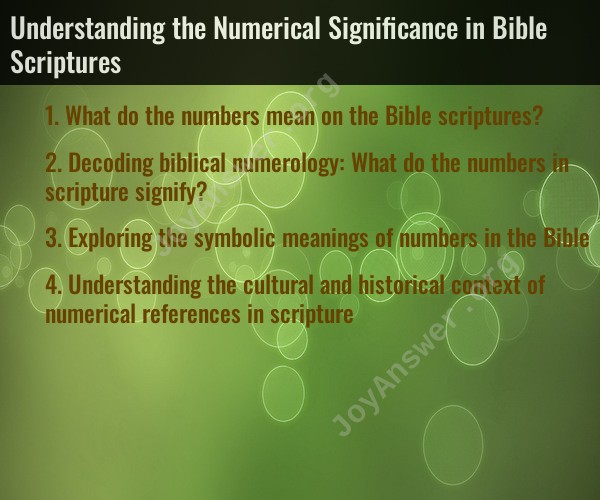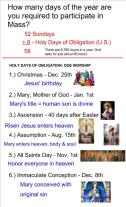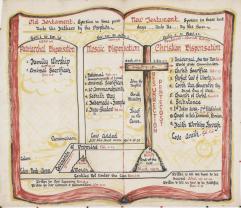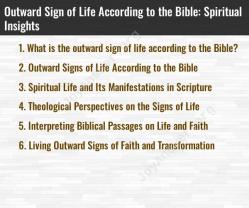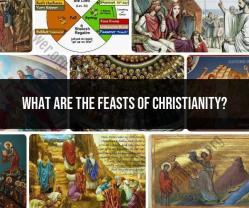What do the numbers mean on the Bible scriptures?
In the Bible, numbers often carry symbolic and spiritual significance, contributing to the layers of meaning in scripture. Here's a brief overview of the symbolic meaning associated with some numbers:
One (1):
- Represents God's singularity, uniqueness, and supremacy.
Two (2):
- Signifies balance, partnership, and the concept of witness or testimony.
Three (3):
- Symbolizes divine perfection, completeness, and the Holy Trinity (Father, Son, and Holy Spirit).
Four (4):
- Represents creation, the material world, and the four corners of the earth.
Five (5):
- Symbolizes God's grace and favor, often associated with His goodness.
Six (6):
- Linked with imperfection and incompleteness, often associated with human labor and fallibility.
Seven (7):
- Signifies divine perfection, completeness, and rest. It is a number often used to denote the fulfillment of God's plan.
Eight (8):
- Represents new beginnings and resurrection, associated with a new era or creation.
Nine (9):
- Signifies divine finality, spiritual growth, and completeness.
Ten (10):
- Symbolizes completeness and order, often representing a full measure of something.
Twelve (12):
- Represents divine authority, governance, and completeness. It is associated with God's chosen people.
Forty (40):
- Represents a period of testing, trial, or probation. It is often linked to preparation and transformation.
Six hundred and sixty-six (666):- Referred to as the number of the beast, associated with imperfection and evil. It appears in the Book of Revelation.
Seven hundred and seventy-seven (777):- Represents divine perfection and is often associated with God's completeness and holiness.
These are just a few examples, and the significance of numbers in the Bible can vary based on context and interpretation. It's important to note that biblical numerology is a symbolic system, and not all numbers carry a specific meaning in every instance. Interpretations may also differ among different theological traditions. Studying the numerical significance in Bible scriptures adds depth to the understanding of the text and the spiritual messages conveyed.
Decoding biblical numerology: What do the numbers in scripture signify?
Numbers are not merely mathematical entities in the Bible; they are imbued with deep spiritual significance and symbolism. Throughout the biblical narrative, numbers serve as a divine language, conveying profound truths and lessons that enrich our understanding of God's character, plan, and relationship with humanity.
The Bible is replete with instances where numbers are used to represent specific concepts, attributes, or events. These numerical patterns are not coincidences; they are intentional and carry significant meaning. Let's delve into the symbolic meanings of some of the most prominent numbers in the Bible.
Number 7: Perfection and Completion
The number seven is arguably the most significant number in the Bible, appearing over 700 times. It is associated with perfection, completeness, and divine fulfillment. The seven days of creation, the sevenfold forgiveness, and the seven churches in Revelation are all examples of the symbolic importance of seven.
Number 3: Trinity and Divine Unity
The number three holds immense significance in the Bible, representing the Trinity – the three-in-one nature of God as Father, Son, and Holy Spirit. The three patriarchs (Abraham, Isaac, and Jacob), the three temple offerings (burnt offering, sin offering, and peace offering), and the three resurrections performed by Jesus all point to the triune nature of God.
Number 40: Testing, Preparation, and Transformation
The number forty appears repeatedly in biblical narratives, symbolizing a period of testing, preparation, or transformation. The Israelites' forty years in the wilderness, Moses' forty days on Mount Sinai, and Jesus' forty days and forty nights of fasting in the desert all represent significant periods of preparation and spiritual growth.
Number 12: Tribes of Israel and Divine Order
The number twelve holds symbolic importance in the Bible, representing the twelve tribes of Israel, the twelve apostles, and the twelve gates of the new Jerusalem. It symbolizes unity, divine order, and the fulfillment of God's covenant with his people.
Cultural and Historical Context of Numerical References
The symbolic meanings of numbers in the Bible are deeply rooted in the cultural and historical context of the time. The ancient Hebrews, like many other cultures, attached significance to numbers, using them to convey complex ideas and convey deeper truths.
For instance, the number seven was associated with creation, perfection, and the divine realm, while the number six was associated with imperfection, human nature, and the physical world. Understanding these cultural and historical nuances is crucial for interpreting numerical symbolism in the Bible.
Significance of Biblical Numerology
Biblical numerology provides a valuable lens through which to understand the richness and complexity of the Bible's message. By recognizing the symbolic meanings of numbers, we gain a deeper appreciation for the divine intentionality embedded in the biblical narrative.
Numerical symbolism serves as a powerful tool for conveying spiritual truths and lessons, connecting us to the divine wisdom embedded in the Bible. It invites us to look beyond the literal meaning of the text and discover the deeper spiritual truths that lie beneath.
As we explore the world of biblical numerology, we embark on a journey of deeper understanding, connecting with God's character, plan, and relationship with humanity in a more profound and meaningful way.
